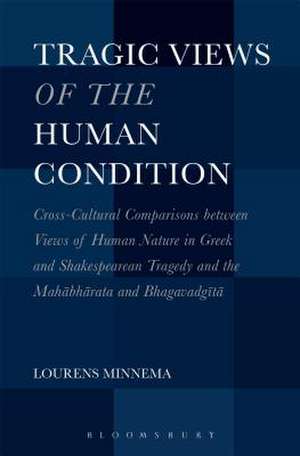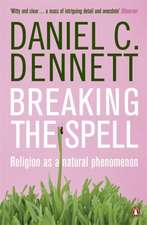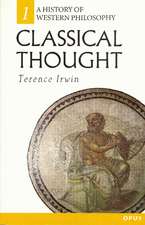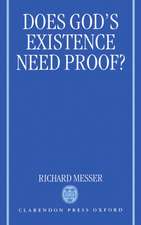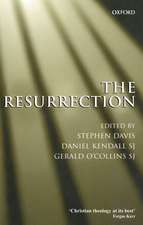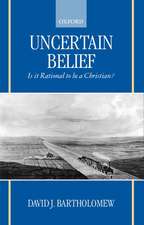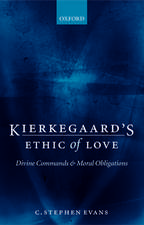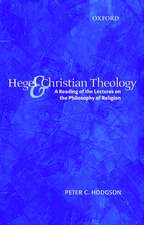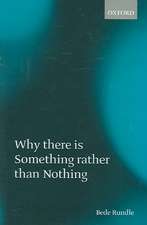Tragic Views of the Human Condition: Cross-Cultural Comparisons between Views of Human Nature in Greek and Shakespearean Tragedy and the Mahabharata and Bhagavadgita
Autor Prof. Lourens Minnemaen Limba Engleză Paperback – 21 oct 2015
Preț: 268.52 lei
Preț vechi: 302.51 lei
-11% Nou
Puncte Express: 403
Preț estimativ în valută:
51.39€ • 55.80$ • 43.17£
51.39€ • 55.80$ • 43.17£
Carte disponibilă
Livrare economică 02-16 aprilie
Preluare comenzi: 021 569.72.76
Specificații
ISBN-13: 9781501305788
ISBN-10: 1501305786
Pagini: 584
Ilustrații: 1 colour image
Dimensiuni: 152 x 229 x 41 mm
Greutate: 0.91 kg
Editura: Bloomsbury Publishing
Colecția Bloomsbury Academic
Locul publicării:New York, United States
ISBN-10: 1501305786
Pagini: 584
Ilustrații: 1 colour image
Dimensiuni: 152 x 229 x 41 mm
Greutate: 0.91 kg
Editura: Bloomsbury Publishing
Colecția Bloomsbury Academic
Locul publicării:New York, United States
Caracteristici
Each chapter compares different aspects of human nature in Greek and Shakespearean and Indian tragedies
Notă biografică
Lourens Minnema is Senior Lecturer in Religious Studies in the Department of Philosophy of Religion and Comparative Study of Religions at VU University, Amsterdam, The Netherlands.
Cuprins
Acknowledgements Chapter 1: Introduction Chapter 2: Narrative aspects Chapter 3: Artistic-communicative aspects Chapter 4: Socio-political aspects Chapter 5: Literary-cultural aspects Chapter 6: Martial aspects Chapter 7: Psycho-ethical aspects Chapter 8: Religious aspects Chapter 9: Concluding observations regarding views of the human conditionNotes Bibliography Author Index Subject Index
Recenzii
This book represents a new kind of scholarly Comparative World Literature for a new kind of global, multicultural readership. It is writing like this, elegant, eloquent and judicious, that contributes to the formation of a shared literary and critical canon. Minnema focuses first on the stories in which views of human nature are embedded and only then on the philosophical and theological theories that derive from them. His ability to move between literary, philosophical and theological discussion provides a masterly example of interdisciplinarity.
In this multi-faceted and comprehensive study, Lourens Minnema explores subject-matter of wide appeal: tragedy and human nature. The reader is immediately engaged by a direct and accessible style, and will benefit from a wealth of absorbing detail and stimulating analysis. This work is a successful demonstration of the value, scope and potential of cross-cultural comparison.
Minnema forges a powerful way to bring textual traditions from Eastern and Western cultures into dialogue and mutual edification. Erudite and insightful, Minnema makes real contributions to philosophy, literature, philology by restoring to the human sciences the most important questions concerning humanity. This is the most original reading of the Bhagavad-Gita in the last few decades. Minnema avoids the mind-numbing mechanics of text-historical methods and bravely asks intelligent questions-questions these texts themselves grapple with, not questions generated in academic laboratories. This book is a pleasure to read.
This is an extraordinary work of comparative literature studying the depiction of human tragedies from the Eastern and Western perspectives. The author takes the Mahabharata and the Bhagavadgita as samples of the Eastern stand on tragedy and compares it with the Greek and Shakespearean literature. This in-depth analysis shows that the very meaning of the word 'tragedy' changes considerably between these cultures. The narrative, artistic, communicative, social, political, literary, cultural, martial, psychological, ethical, and religious aspects of tragedy are dealt with. The thoroughness of the work is simply amazing and invites the reader to look at tragedy from an informed perspective. This book is a handy reference for all students of comparative literature.
This ambitious study explores, in nine chapters, a wide range of aspects of tragedy in ancient India, Greece, and Shakespeare. It is marked throughout by deep scholarship and sensitivity to cross-cultural and historical differences . Most fascinating is chapter 7, 'Psycho-Ethical Aspects,' which compares the psychic conflicts, moral dilemmas, pursuit of self-knowledge, and types of wrongdoing in the three tragic traditions . Summing Up: Highly recommended. Upper-division undergraduates through researchers/faculty.
In this multi-faceted and comprehensive study, Lourens Minnema explores subject-matter of wide appeal: tragedy and human nature. The reader is immediately engaged by a direct and accessible style, and will benefit from a wealth of absorbing detail and stimulating analysis. This work is a successful demonstration of the value, scope and potential of cross-cultural comparison.
Minnema forges a powerful way to bring textual traditions from Eastern and Western cultures into dialogue and mutual edification. Erudite and insightful, Minnema makes real contributions to philosophy, literature, philology by restoring to the human sciences the most important questions concerning humanity. This is the most original reading of the Bhagavad-Gita in the last few decades. Minnema avoids the mind-numbing mechanics of text-historical methods and bravely asks intelligent questions-questions these texts themselves grapple with, not questions generated in academic laboratories. This book is a pleasure to read.
This is an extraordinary work of comparative literature studying the depiction of human tragedies from the Eastern and Western perspectives. The author takes the Mahabharata and the Bhagavadgita as samples of the Eastern stand on tragedy and compares it with the Greek and Shakespearean literature. This in-depth analysis shows that the very meaning of the word 'tragedy' changes considerably between these cultures. The narrative, artistic, communicative, social, political, literary, cultural, martial, psychological, ethical, and religious aspects of tragedy are dealt with. The thoroughness of the work is simply amazing and invites the reader to look at tragedy from an informed perspective. This book is a handy reference for all students of comparative literature.
This ambitious study explores, in nine chapters, a wide range of aspects of tragedy in ancient India, Greece, and Shakespeare. It is marked throughout by deep scholarship and sensitivity to cross-cultural and historical differences . Most fascinating is chapter 7, 'Psycho-Ethical Aspects,' which compares the psychic conflicts, moral dilemmas, pursuit of self-knowledge, and types of wrongdoing in the three tragic traditions . Summing Up: Highly recommended. Upper-division undergraduates through researchers/faculty.
